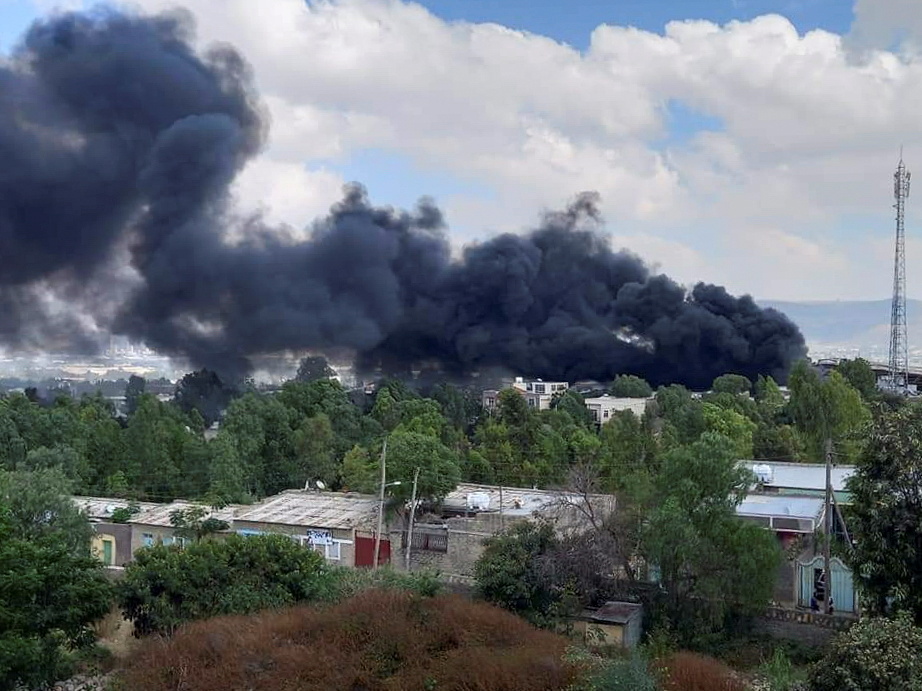The Ethiopian government carried out a second air strike within hours on the Tigray region on Wednesday, significantly escalating a campaign to weaken rebellious Tigrayan forces in an almost one-year-old war.
The second strike was in Agbe in the Temben region some 80 km (50 miles) west of the regional capital Mekelle, targeting a military training centre and heavy artillery depot, government spokesperson Legesse Tulu said.
That came after a morning air strike in Mekelle, the third this week. Tigrai Television said the attack targeted the centre of the city while the Addis Ababa government said it targeted buildings where Tigrayan forces were repairing armaments.
The Tigray People’s Liberation Front (TPLF) has “been adept at hiding munitions and heavy artillery in places of worship and using ordinary Tigrayans as a human shield”, Legesse said.
Two witnesses and a humanitarian source in Mekelle told Reuters that the morning strike appeared to have targeted Mesfin Industrial Engineering PLC, a factory complex which the government believes supports the TPLF.
TPLF leader Debretsion Gebremichael, referring to government forces, said: “They are desperate on the war front. My interpretation is they are bombing us because they are losing on the ground and it’s their reprisal. The fact that they are bombing shows they don’t care about Tigrayan civilians.”
Speaking to Reuters by satellite phone from an undisclosed location, Gebremichael said the strike did not hit the engineering complex, rather another private company compound, but he had no further details.
Nine civilians, including a five-year-old child, were being treated at Ayder Referral Hospital for injuries sustained in the strike, according to TPLF-run Tigrai Television.
The blast shattered the windows of Mekelle General Hospital, about one kilometre away from Mesfin Industrial, and damaged nearby homes, said a doctor at the hospital. It had received five wounded people, he said.
“Four of them were factory employees and the fifth one is a lady whose lives near the factory. Her house was destroyed by the air strike,” the doctor said.
Tigrai Television posted photographs of what appeared to be plumes of billowing smoke. Reuters geolocated the images to Mekelle.
The two sides have been fighting for almost a year in a conflict that has killed thousands of people and displaced more than two million amid a power struggle between the TPLF, which controls the northern region, and the central government of Prime Minister Abiy Ahmed in Addis Ababa.
The TPLF dominated the Horn of Africa country’s ruling party for decades before Abiy, who is not a Tigrayan, took office in 2018.
CONTROL OF THE SKIES
Mesfin Industrial Engineering is an equipment manufacturer and car and truck assembly plant that was part of EFFORT, a TPLF-owned conglomerate.
After war broke out last November, the government froze the company’s bank accounts, saying there was evidence that it was supporting the TPLF. The company could not be reached for comment. Most communications in Mekelle are down.
Mekelle was also hit by two air strikes on Monday https://www.reuters.com/world/africa/mekelle-capital-ethiopias-tigray-hit-by-air-strikes-regional-tv-2021-10-18. The TPLF accused the government of launching the attacks. A government official initially denied the accusation but state media later reported the air force had conducted a strike.
The attacks follow intensified fighting in two other northern regions where the military is trying to recover territory taken by the TPLF, which recaptured Mekelle and most of the rest of Tigray several months ago.
In July, the TPLF pushed into the two other regions, Amhara and Afar, and several hundred thousand more people fled their homes, according to the United Nations.
Last week, after the TPLF said the military had started an offensive in Amhara, the military said that the TPLF had “opened war on all fronts”, and that government forces were inflicting heavy casualties.
“The federal air strikes on Mekelle appear to be part of efforts to weaken Tigray’s armed resistance, which has recently made further gains in eastern Amhara region, with fighting ongoing in some areas,” said Will Davison, a senior analyst on Ethiopia at the International Crisis Group think-tank.
“Along with superior manpower, control of the skies is one of the few remaining areas of military advantage for the federal government,” Davison said.
(Reporting by Addis Ababa newsroom with additional reporting by George Sargent in London and Nairobi newsroom; writing by Maggie Fick; editing by Nick Macfie, Angus MacSwan and Mark Heinrich)
